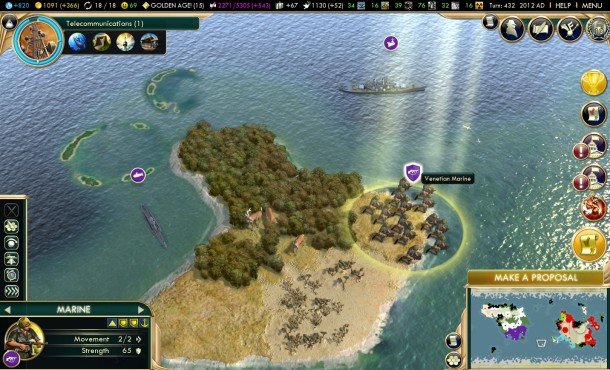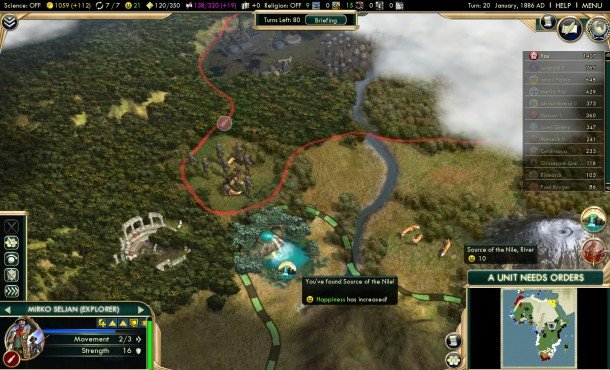Our Verdict
The last few herbs and spices that Civ Vs epic stew was missing. A recipe for hundreds of hours more delicious turn-based strategy.
PC Gamer's got your back
Civilization V was always the most fun just before the end of the Renaissance, with the experience sliding into a slog post industrialization. The new mechanics added in the previous expansion, Gods and Kings, grow less relevant, and you're either well on your way to your chosen victory condition, or pretty far from it. Brave New World creates an endgame that is as varied, textured, and tense as the early and mid game already were. Overhauls to the cultural and diplomatic victories have made achieving either of these a more hands-on, aggressive process that will keep you making meaningful decisions and planning ahead.
The most noticeable chunk of these improvements comes in the form of the World Congress, an expansion of the United Nations that was (and still is) the path to diplomatic victory. Now coming into play in the late Renaissance/early Industrial era (when things used to bog down), the nations of the world and their city-state allies can vote on measures like banning nuclear weapons, building cooperative wonders, or embargoing a given civ—with truly devastating economic consequences, given the moneymaking potential of the new trade route system.
Whereas income was largely a matter of upgrading your cities before, Trade Routes are now the main means of generating gold. Following the expansion's theme of making passive game elements more active, you'll build caravans and cargo ships, then decide where to send them. You need to be trading with other civs or city-states to generate cash, which adds another interesting diplomatic layer. If you're a megalomaniacal conqueror hated by all, you'll find yourself without trading partners, and your economy will almost certainly crash.

The other new mechanic is Tourism, a resource that opposes the culture value of other civs. If your Tourism outpaces their Culture, you can eventually become Influential among their people. Doing so with all remaining civs is the new means of achieving cultural victory. Tourism is generated by Great Works of Art, Writing, and Music, each created by a new or revised form of Great Person. The new systems take Culture Victory from probably the most boring way to end the game to one of the most active and engaging.
Serenissima!
Of the nine new civilizations added for this expansion , I was especially captivated by Venice. Essentially a playable city-state that can never found or annex new cities, Venetians rely on the ability to build double the number of trade routes as anyone else, which becomes a licence to print money in the late game. It's probably the most out-of-the-box civ in the franchise's history, and playing it is a whole new experience.
Firaxis has also thrown in a group of new historical scenarios: the lackluster American Civil War, and the Scramble for Africa. This latter option is a deep, extremely replayable map, featuring a randomly-generated, explorable interior for the continent and three different victory conditions. Each of the three groupings of civs—Europeans, North Africans, and Sub-Saharan Africans—have very different goals, and because the map is different each time, playing the same culture group twice doesn't diminish the scenario's great sense of discovery. It stands alongside the likes of Fall of Rome as some of the most fun I've had with Civ V.

Comparing diplomats to pope hats, Brave New World isn't quite as much of a step forward as the Gods and Kings expansion. But the later eras are an entirely new affair, solving some of the game's largest problems in novel and enjoyable ways. Brave New World's additions to the already-excellent Civ V have resulted in the high point of the franchise, and one of history's greatest turn-based strategy experiences.
The last few herbs and spices that Civ Vs epic stew was missing. A recipe for hundreds of hours more delicious turn-based strategy.
Len Hafer is a freelancer and lifelong PC gamer with a specialty in strategy, RPGs, horror, and survival games. A chance encounter with Warcraft 2: Tides of Darkness changed her life forever. Today, her favorites include the grand strategy games from Paradox Interactive like Crusader Kings and Europa Universalis, and thought-provoking, story-rich RPGs like Persona 5 and Disco Elysium. She also loves history, hiking in the mountains of Colorado, and heavy metal music.


